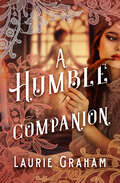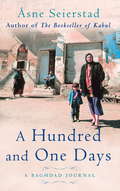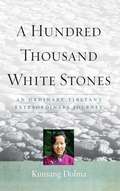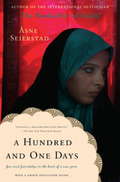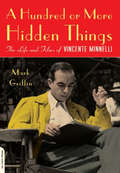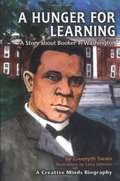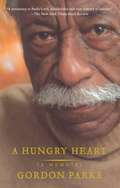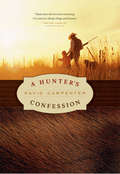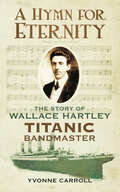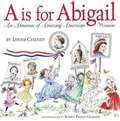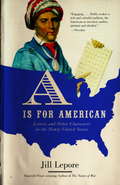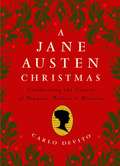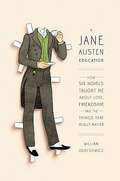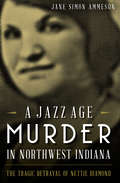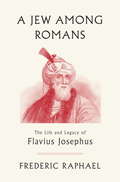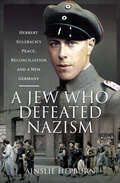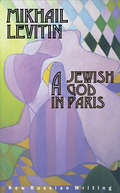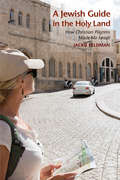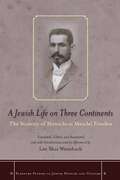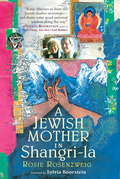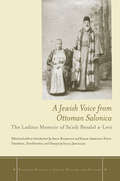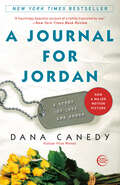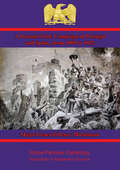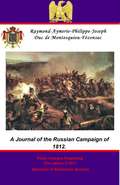- Table View
- List View
A Humble Companion
by Laurie Graham&“A portrait of the riotous, tragicomic, dysfunctional, bonkers Royal family of poor George III. . . . Fascinating, very, very funny, ultimately humane.&” —Marian Keyes, international bestselling author When Nellie Welche is appointed companion to Princess Sophia, her family is delighted. It&’s more than her father, steward to the Prince of Wales, ever imagined for his daughter. But once Nellie begins spending her days in close quarters with the royal family, she discovers the world within the palace is not at all what she expected. Rather than attending royal balls and society events, Princess Sofy and her sisters live in isolation. There&’s also affable King George III, whose struggles with madness only deepen the privacy in which the royals must live. Over the course of a lifetime, Sofy and Nellie become inseparable. But as Sofy&’s dearest friend, Nellie is also the keeper of her secrets—until the scandal that threatens their relationship . . . and the reputation of the House of Hanover. &“Funny, fascinating and profoundly moving.&” —Freya North, international bestselling author of The Turning Point &“A delightfully smart and sophisticated historical novelist.&” —The Sunday Times &“Every page is a joy to read.&” —Daily Mail
A Hundred And One Days: A Baghdad Journal - from the bestselling author of The Bookseller of Kabul
by Asne SeierstadA fascinating, personal and insightful account of the Iraq war from the bestselling author of THE BOOKSELLER OF KABULIn January 2003 Åsne Seierstad entered Baghdad on a ten-day visa. She was to stay for over three months, reporting on the war and its aftermath. A Hundred and One Days is her compelling account of a city under siege, and a fascinating insight into the life of a foreign correspondent. An award-winning writer, Seierstad brilliantly details the frustrations and dangers journalists faced trying to uncover the truth behind the all-pervasive propaganda. She also offers a unique portrait of Baghdad and its people, trying to go about their daily business under the constant threat of attack. Seierstad's passionate and erudite book conveys both the drama and the tragedy of her one hundred and one days in a city at war.'Åsne Seierstad is the supreme non-fiction writer of her generation' Luke Harding
A Hundred And One Days: A Baghdad Journal - from the bestselling author of The Bookseller of Kabul
by x Asne SeierstadA fascinating, personal and insightful account of the Iraq war from the bestselling author of THE BOOKSELLER OF KABULIn January 2003 Åsne Seierstad entered Baghdad on a ten-day visa. She was to stay for over three months, reporting on the war and its aftermath. A Hundred and One Days is her compelling account of a city under siege, and a fascinating insight into the life of a foreign correspondent. An award-winning writer, Seierstad brilliantly details the frustrations and dangers journalists faced trying to uncover the truth behind the all-pervasive propaganda. She also offers a unique portrait of Baghdad and its people, trying to go about their daily business under the constant threat of attack. Seierstad's passionate and erudite book conveys both the drama and the tragedy of her one hundred and one days in a city at war.'Åsne Seierstad is the supreme non-fiction writer of her generation' Luke Harding
A Hundred Thousand White Stones
by Kunsang Dolma Evan DennoA Hundred Thousand White Stones is one young Tibetan woman's fearlessly told story of longing and change. Kunsang Dolma writes with unvarnished candor of the hardships she experienced as a girl in Tibet, violations as a refugee nun in India, and struggles as an immigrant and new mother in America. Yet even in tribulation, she finds levity and never descends to self-pity. We watch in wonder as her unlikely choices and remarkable persistence bring her into ever-widening circles, finding love and a family in the process, and finally bringing her back to her childhood home. A Hundred Thousand White Stones offers an honest assessment of what is gained in pursuing life in the developed world and what is lost.
A Hundred and One Days: A Baghdad Journal
by Asne SeierstadFor one hundred and one days Asne Seierstad worked as a reporter in Baghdad. <P><P>Always in search of a story far less obvious than the American military invasion, Seierstad brings to life the world behind the headlines in this compelling- and heartbreaking-account of her time among the people of Iraq. From the moment she first arrived in Baghdad on a ten-day visa, she was determined to unearth the modern secrets of an ancient place and to find out how the Iraqi people really live. What do people miss most when their world changes overnight? What do they choose to say when they can suddenly say what they like? Seierstad reveals what life is like for everyday people under the constant threat of attack- first from the Iraqi government and later from American bombs. Displaying the novelist's eye and lyrical storytelling that have won her awards around the world, Seierstad here brings to life an unforgettable cast of characters, from foreign press apparatchik Uday, to Zahra, a mother of three, to Aliya, the guide and translator who becomes a friend. Putting their trust in a European woman with no obvious agenda, these and other Iraqis speak for themselves, to tell the stories we never see on the evening news.
A Hundred or More Hidden Things: The Life and Films of Vincente Minnelli
by Mark GriffinIn this biography, Griffin, a writer and reviewer, traces the life and films of filmmaker Vincente Minelli (1903-1986), director of Meet Me in St. Louis, An American in Paris, and Gigi. Drawing from interviews with actors, colleagues, and friends (but neither of his daughters), Griffin recounts his childhood, unconventional upbringing, ambiguous sexuality, the autobiographical nature of his work, his work with famous actors, his many films, his family secrets, his marriages, including to Judy Garland, and his relationship with daughter Liza Minelli. Annotation ©2010 Book News, Inc. , Portland, OR (booknews. com)
A Hunger for Learning: A Story about Booker T. Washington
by Gwenyth SwainAs a small child, Booker T. Washington longed to learn how to read and write, but slaves weren't allowed to go to school. When the Civil War ended, Booker was free. He persuaded teachers at the Hampton Institute to let him work at their school in exchange for classes. Booker did so well that Hampton's principal recommended him to start up a new school in Alabama. Brick by brick, Washington and his students built Tuskegee Institute, which became one of the nation's most respected colleges for black students. Dedicating his life to education, Booker T. Washington was one of the most important African American leaders of his time.
A Hungry Heart: A Memoir
by Gordon ParksGordon Parks, acclaimed photographer, filmmaker, composer, and author of fiction and nonfiction, has participated in, been witness to, and documented many of the major events in the twentieth and the twenty-first centuries. Born in Fort Scott, Kansas, on November 30, 1912, he left home at age fifteen when his mother passed away. For the next twelve years, he lived in Minneapolis, Minnesota, working as a piano player, bus boy, Civilian Conservation Corpsman, and professional basketball player before taking up photography in the late 1930s and moving to Chicago. He was awarded the first Julius Rosenwald Fellowship in photography in 1942 and chose to work with Roy Stryker at the Farm Security Administration (FSA) in Washington, D. C. During World War II, he was an Office of War Information (OWI) correspondent. He photographed fashion for Vogue and Glamour before joining the staff of Life in 1949 and remained a photojournalist for the magazine until 1969. He also became famous in the late 1960s for his stories on Black revolutionaries, later incorporated into his book Born Black. He was a founder and editorial director of Essence magazine from 1970 to 1973. His film career began in 1961 when he wrote and directed a documentary, Flavio. He received an Emmy Award for another documentary, Diary of a Harlem Family, in 1968. He produced and directed Hollywood films including The Learning Tree, Shaft, Shaft's Big Score, The Super Cops, and Leadbelly. He is first and foremost a celebrated photojournalist and fine art photographer whose work, collected and exhibited worldwide, is emblematic of American culture. In A Hungry Heart, he reaches into the corridors of his memory and recounts the people and events that shaped him: from growing up poor on the Kansas prairie to withstanding the unbearably cold winters of Minnesota to living on the edge of starvation in Harlem during the Depression. He more than survived the challenges and crises of his life; he thrived and has become one of the most celebrated and diversely talented figures in American culture.
A Hunter's Confession
by David CarpenterA Hunter's Confession tells the story of hunting in David Carpenter's life, including the reasons he once loved it and the reasons he no longer pursues it. When he was a boy, Carpenter and his father and brother would head out along the side roads and into the prairie marshlands searching for duck, grouse, and partridge. As a young man, he began skulking around the bushes with his hunting buddies and trudging through groves of larch, alpine fir, and willow in search of elk. Later, hunting became a form of therapy, a way to ward off melancholy and depression. In the end, as a result of a dramatic experience after shooting a grouse, Carpenter gave up hunting for good.Winding through this personal narrative is Carpenter's exploration of the history of hunting, subsistence hunting versus hunting for sport, trophy hunting, and the meaning of the hunt for those who have written about it most eloquently. Are wild creatures somehow our property? How is the sport hunter different from the hunter who must kill game to survive? Is there some sort of bridge that might connect aboriginal hunters to non-aboriginal hunters? Why do many hunters feel most fully alive when they
A Hymn for Eternity: The Story of Wallace Hartley, Titanic Bandmaster
by Yvonne CarrollThe band playing ‘Nearer my God to Thee’ as the ship went down is probably one of the most famous stories relating to the Titanic. The bravery of the band and their leader, Wallace Hartley, is one of the endearing stories to come out of the worst disaster to happen to a British passenger liner. Who comprised the band? Who was Wallace Hartley and where did he come from? Not much has been written about this enigmatic band leader or of his part in the tragedy, beyond a few mentions in the many books on the disaster. But he was one of the most important characters in the story of Titanic. Yvonne Speak has spent years researching the life story of Wallace Hartley and has conducted interviews with remaining members of his family. Here she tells his story and remembers this most British of heroes.
A Is For Abigail: An Almanac Of Amazing American Women
by Lynne Cheney Robin Preiss GlasserLynne Cheney and Robin Preiss Glasser collaborated on America: A Patriotic Primer, which captured the imagination of American children and became a national best-seller. Now they turn their hands to A is for Abigail: An Almanac of Amazing American Women and bring the great women of American history to life. Filled to the brim with words and pictures that celebrate the remarkable (although often unmarked) achievements of American women, this is a book to relish and to read again and again. <p><p> Mothers, daughters, schoolchildren, generations of families -- everyone -- will take Abigail Adams's words to heart and "remember the ladies" once they read the stories of these astonishing, astounding, amazing American women.
A Is for American: Letters and Other Characters in the Newly United States
by Jill LeporeLepore (history, Boston U.) sketches the character of seven men, from Noah Webster (1758-1843) to Alexander Graham Bell (1847-1922) who have in common their belief that letters, alphabets, syllabaries, signs, and codes hold nations together. She portrays them grappling with the fear of disunity from revolution to reconstruction. Annotation c. Book News, Inc., Portland, OR (booknews.com)
A Jane Austen Christmas
by Carlo DevitoFilled with the remarkable wit and insight of one of the world's most cherished authors, A Jane Austen Christmas gives readers insight into Austen's life through little-known stories about how she and her family celebrated the treasured holiday season. Carlo DeVito provides an intimate portrait of Austen's most cherished Christmas memories with her family: from the gift of her first writing desk, to her first love and heartbreak, to her brewing mead and beer in time for the holidays. Along the way readers will spend a holiday in the Austen house, celebrate Jane's birthday, meet the inspiration for more than a dozen characters, attend the Christmastide series of balls, and learn how to make family's favorite recipes and dedicate a novel to the Prince Regent. Remarkably fresh and supremely entertaining, A Jane Austen Christmas brings Austen's world to life as never before.
A Jane Austen Education: How Six Novels Taught Me About Love, Friendship, and the Things That Really Matter
by William DeresiewiczAn eloquent memoir of a young man's life transformed by literature. In A Jane Austen Education, Austen scholar William Deresiewicz turns to the author's novels to reveal the remarkable life lessons hidden within. With humor and candor, Deresiewicz employs his own experiences to demonstrate the enduring power of Austen's teachings. Progressing from his days as an immature student to a happily married man, Deresiewicz's A Jane Austen Education is the story of one man's discovery of the world outside himself. A self-styled intellectual rebel dedicated to writers such as James Joyce and Joseph Conrad, Deresiewicz never thought Austen's novels would have anything to offer him. But when he was assigned to read Emma as a graduate student at Columbia, something extraordinary happened. Austen's devotion to the everyday, and her belief in the value of ordinary lives, ignited something in Deresiewicz. He began viewing the world through Austen's eyes and treating those around him as generously as Austen treated her characters. Along the way, Deresiewicz was amazed to discover that the people in his life developed the depth and richness of literary characters-that his own life had suddenly acquired all the fascination of a novel. His real education had finally begun. Weaving his own story-and Austen's-around the ones her novels tell, Deresiewicz shows how her books are both about education and themselves an education. Her heroines learn about friendship and feeling, staying young and being good, and, of course, love. As they grow up, they learn lessons that are imparted to Austen's reader, who learns and grows by their sides. A Jane Austen Education is a testament to the transformative power of literature, a celebration of Austen's mastery, and a joy to read. Whether for a newcomer to Austen or a lifelong devotee, Deresiewicz brings fresh insights to the novelist and her beloved works. Ultimately, Austen's world becomes indelibly entwined with our own, showing the relevance of her message and the triumph of her vision.Watch a Video
A Jazz Age Murder in Northwest Indiana: The Tragic Betrayal of Nettie Diamond (True Crime Ser.)
by Jane Simon AmmesonGold digging, adultery, and a slaying on Valentine&’s Day, 1923, in this &“juicy . . . page-turner&” of a true crime story (Chicago Tribune). It was a Roaring Twenties fatal attraction. Nettie Herskovitz was wealthy and widowed when she met Harry Diamond. The attentive, irresistibly sexy twenty-three-year-old suitor would become Nettie&’s fifth husband. He was also a bootlegger, pimp, and first-class hustler who thought he&’d wed a goldmine. What Harry found instead was a fiercely independent older woman who was nobody&’s fool for long. Then, on February 14, 1923, Harry tried to secure his inheritance by shooting Nettie four times, once at point blank range to the head. He blamed the crime on their teenage African American chauffeur. Harry might have gotten away with it, if not for one little oversight. Nettie wasn&’t dead. With its combination of sin, sex, high-society scandal, and even the interference of the Ku Klux Klan, the case against the movie-star handsome Harry Diamond moved beyond tabloid fodder to become the most sensational trial of the era.
A Jew Among Romans
by Frederic RaphaelFrom the acclaimed biographer, screenwriter, and novelist Frederic Raphael, here is an audacious history of Josephus (37-c.100), the Jewish general turned Roman historian, whose emblematic betrayal is a touchstone for the Jew alone in the Gentile world. Joseph ben Mattathias's transformation into Titus Flavius Josephus, historian to the Roman emperor Vespasian, is a gripping and dramatic story. His life, in the hands of Frederic Raphael, becomes a point of departure for an appraisal of Diasporan Jews seeking a place in the dominant cultures they inhabit. Raphael brings a scholar's rigor, a historian's perspective, and a novelist's imagination to this project. He goes beyond the fascinating details of Josephus's life and his singular literary achievements to examine how Josephus has been viewed by posterity, finding in him the prototype for the un-Jewish Jew, the assimilated intellectual, and the abiding apostate: the recurrent figures in the long centuries of the Diaspora. Raphael's insightful portraits of Yehuda Halevi, Baruch Spinoza, Karl Kraus, Benjamin Disraeli, Ludwig Wittgenstein, and Hannah Arendt extend and illuminate the Josephean worldview Raphael so eloquently lays out.
A Jew Who Defeated Nazism: Herbert Sulzbach's Peace, Reconcilliation and a New Germany
by Ainslie HepburnHerbert Sulzbach (18941985), was an influential figure in Britain and Germany who made a remarkable personal contribution to Anglo-German reconciliation following the Second World War. Working with German prisoners of war in Britain in camps that included fanatical Nazis, he guided men of all ranks - including senior officers - to personal educational and cultural achievements in preparation for peace and reconciliation. This graphic and moving account of an untold story shows where reconciliation, and a 'new Germany', were fostered. It is also a personal and family story and a microcosm of European history. Sulzbach was from an elite German Jewish banking family, and educated in the ideals of the German Enlightenment. In the First World War, he served as a front-line artillery officer with the German Imperial Army. Defeat was a shattering disappointment, and the economic depression ruined his business and the family banking fortunes. Sulzbach's life in Berlin with his artistic fe, Beate, was cushioned by wealth and the cultural life of the city, but National Socialism brought this to an end and he fled with Beate to exile in England where they were interned as 'enemy aliens'. On release, Sulzbach served with the British army and found his calling as an interpreter and educator in PoW camps where his work of 'de-nazification' and re-education paved the way to reconciliation.
A Jewish God in Paris
by Mikhail Levitin"The picture resembles a Chagall painting. . . . Or perhaps this anti-autobiography is meant to satirize the old Russian question 'Who is to blame?' with the Jewish answer: Me."--The Times Literary Supplement In the title novella the hero, after a marital infidelity, takes his family to Paris hoping to win his beautiful wife's forgiveness.
A Jewish Guide in the Holy Land
by Jackie FeldmanFor many Evangelical Christians, a trip to the Holy Land is an integral part of practicing their faith. Arriving in groups, most of these pilgrims are guided by Jewish Israeli tour guides. For more than three decades, Jackie Feldman--born into an Orthodox Jewish family in New York, now an Israeli citizen, scholar, and licensed guide--has been leading tours, interpreting Biblical landscapes, and fielding questions about religion and current politics. In this book, he draws on pilgrimage and tourism studies, his own experiences, and interviews with other guides, Palestinian drivers and travel agents, and Christian pastors to examine the complex interactions through which guides and tourists "co-produce" the Bible Land. He uncovers the implicit politics of travel brochures and religious souvenirs. Feldman asks what it means when Jewish-Israeli guides get caught up in their own performances or participate in Christian rituals, and reflects on how his interactions with Christian tourists have changed his understanding of himself and his views of religion.
A Jewish Life on Three Continents: The Memoir of Menachem Mendel Frieden
by Lee Shai WeissbachThis remarkable memoir by Menachem Mendel Frieden illuminates Jewish experience in all three of the most significant centers of Jewish life during the late nineteenth and early twentieth centuries. It chronicles Frieden's early years in Eastern Europe, his subsequent migration to the United States, and, finally, his settlement in Palestine in 1921. The memoir appears here translated from its original Hebrew, edited and annotated by Frieden's grandson, the historian Lee Shai Weissbach. Frieden's story provides a window onto Jewish life in an era that saw the encroachment of modern ideas into a traditional society, great streams of migration, and the project of Jewish nation building in Palestine. The memoir follows Frieden's student life in the yeshivas of Eastern Europe, the practices of peddlers in the American South, and the complexities of British policy in Palestine between the two World Wars. This first-hand account calls attention to some often ignored aspects of the modern Jewish experience and provides invaluable insight into the history of the time.
A Jewish Mother in Shangri-la
by Rosie RosenzweigAn old joke tells of a Jewish woman who treks to the Himalayas to seek an audience with a guru sitting in seclusion on a mountaintop. When at last she comes before him, she implores: "Sheldon, come home!" Rosie Rosenzweig became that Jewish mother--but in real life, the story has a different ending. Instead of asking her Buddhist son, Ben, to come home, Rosie accepts his invitation to find out about Buddhism firsthand. Together they visit retreat centers in Europe and Asia and meet leading meditation masters who are Ben's gurus: Vietnamese teacher Thich Nhat Hanh and Tibetan lamas Tulku Urgyen Rinpoche and Chökyi Nyima Rinpoche. While struggling to come to terms with Ben's choice of a spiritual path so different from everything that she cherishes, Rosie finds that she is learning more about herself than she anticipated. The adventures of Rosie recounts take her from her Boston suburb to a Zen hermitage in France, an enclave of Tibetan Buddhists in Nepal, and finally to her own spiritual home in Jerusalem. Whether she is practicing mindfulness meditation, sharing a cup of tea with a Zen master, or worrying about bowing down to idols, Rosie is intent in her quest to find common ground between two ancient traditions, to deepen her understanding of her son, and to find a way to her own authentic experience of truth. Hers is a mission of peace that seeks to build a bridge of understanding between cultures and faiths while remaining true to her own Jewish identity.
A Jewish Voice from Ottoman Salonica
by Aron Rodrigue Sarah Abrevaya SteinThis book presents for the first time the complete text of the earliest known Ladino-language memoir, transliterated from the original script, translated into English, and introduced and explicated by the editors. The memoirist, Sa'adi Besalel a-Levi (1820–1903), wrote about Ottoman Jews' daily life at a time when the long-ascendant fabric of Ottoman society was just beginning to unravel. His vivid portrayal of life in Salonica, a major port in the Ottoman Levant with a majority-Jewish population, thus provides a unique window into a way of life before it disappeared as a result of profound political and social changes and the World Wars. Sa'adi was himself a prominent journalist and publisher, one of the most significant creators of modern Sephardic print culture. He was also a rebel, accusing the Jewish leadership of Salonica of being corrupt, abusive, and fanatical; that leadership, in turn, excommunicated him from the Jewish community. The experience of excommunication pervades Sa'adi's memoir, which documents a world that its author was himself actively involved in changing.
A Journal for Jordan: A Story of Love and Honor
by Dana CanedyIn 2005, First Sergeant Charles Monroe King began to write what would become a 200-page journal for his son in case he did not make it home from Iraq. King, forty-eight, was killed on 14 October 2006. His son, Jordan, was six months old, and they had spent only two weeks together. A JOURNAL FOR JORDAN is a father's letter to the son he will never see again. In it he gives his boy advice on everything from how to withstand disappointment to how to behave on a date, and his very personal and wrenching accounts of losing men in battle. It is also a mother's search for answers. Why did King volunteer for the mission that killed him? Why was it such a struggle to accept this man she deeply loved as he was Optioned for film by Denzel Washington and Columbia Pictures, A JOURNAL FOR JORDAN is a tender introduction, a loving good-bye, a reporter's inquiry into her soldier's life and a heartrending reminder of the human cost of war.
A Journal of the Campaign in Portugal and Spain
by Major-General Henry MackinnonThis ebook is purpose built and is proof-read and re-type set from the original to provide an outstanding experience of reflowing text for an ebook reader. The body of Major-General Mackinnon now lies in St. Paul's Cathedral in London, next to his brother officer Major-General Robert Craufurd, both casualties of the assault on Cuidad Rodrigo during the Peninsular War. Mackinnon left behind his private journal filled with the details of the scenery, manners, customs and people of both Spain and Portugal as he found them during the Peninsular War, right up until his death. The journal was only intended for perusal by his closest family, but bears closer examination by those interested in the Peninsular War. Title - A Journal of the Campaign in Portugal and Spain Sub-Title - Containing Remarks on the Inhabitants, Customs, Trade and Cultivation, of those Countries, From the Year 1809 to 1812. Author -- Major-General Henry Mackinnon (????-1812) Text taken, whole and complete, from the edition published in 1907, London, by Longmans and Green. Original - iii and 102 pages.
A Journal of the Russian Campaign of 1812.
by Pickle Partners Publishing Général Raymond-Aymerie-Philippe-Joseph, Duc de Montesquiou-Fézensac General Sir William Thomas KnollysThis ebook is purpose built and is proof-read and re-type set from the original to provide an outstanding experience of reflowing text for an ebook reader. An acclaimed classic of the many memoirs to have survived from the epic, tragic and disastrous Russian Campaign of 1812. This translation is taken from chapters of Fézensac's larger memoir - Souvenirs Militaires de 1804 a 1815 par le duc de Fezensac, Paris, 1863. The author starts the campaign as an aide-de-camp attached to the General Staff, and is slightly more insulated to the horrors of the march to Moscow, although glimpses of the hardships reach even the higher reaches of command. Later, after the fire and sack of Moscow, he takes command of regiment of infantry and it is then that the truly epic struggles the men undertook against their principal nature on the retreat from Moscow. His regiment forms part of Maréchal Ney's dwindling, over-worked, staving rearguard, and is witness to its trials and Homeric travails including the crossings of the Dneiper and Berezina. This edition is introduced by a withy summation of the campaign by General Knollys, who without impinging on the narrative, gives a good overall account of the campaign leaving the details of Fézensac's experiences to be brought out in his own words. Raymond-Aymerie-Philippe-Joseph de Montesquiou-Fézensac, born in Paris in 1784 into an ancient noble family, a cadet branch of the House of Gascony, he volunteered as a private soldier in 1803. He achieved rapid promotion in the campaigns of 1805 and 1806, and later serving as Maréchal Ney's aide-de-camp. His promotion would not have been hampered by his marriage to Mademoiselle Clarke, daughter of the Minister of War, General Clarke who held this post the majority of the Empire, also played a pivotal role in the fall of Paris and Napoleon's abdication in 1814. Created a baron of the empire by Napoleon, he had been promoted to the rank of chef d'escadron by the time of the 1812 Russian campaign. He was promoted to général de brigade in 1813 during the German campaign of 1813 but did not rally to Napoleon during the Hundred Days. He was elevated to the title of comte in 1817 and duc in 1821. The text is taken from the edition published in 1852 by Parker, Furnivall, and Parker, London Author: Raymond-Aymerie-Philippe-Joseph de Montesquiou-Fézensac 1784-1867 Translator and Introduction: General Sir William Thomas Knollys 1797-1883
